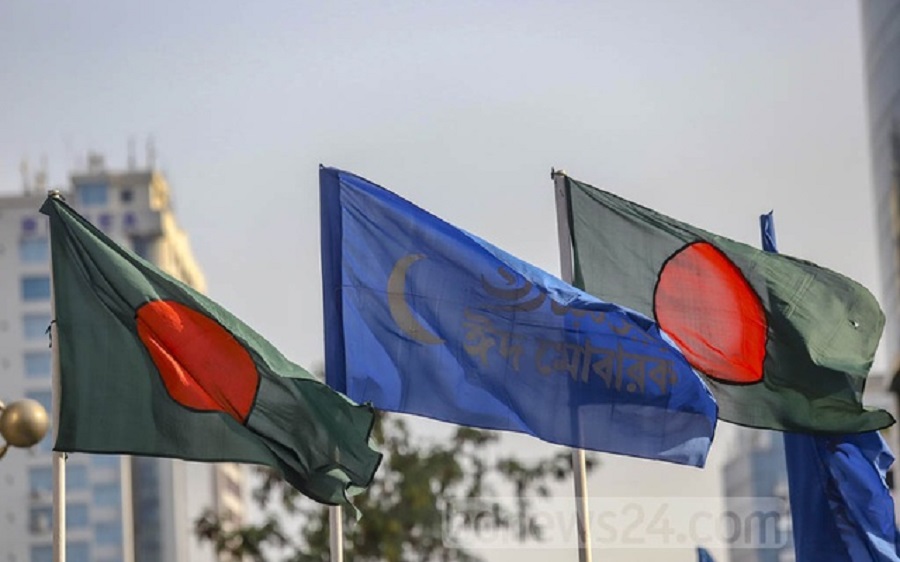
Although the coronavirus pandemic is yet to be eliminated, it has ebbed to a certain extent when the Eid-ul-Fitr is going to be celebrated. Bangladesh is preparing to celebrate Eid with full festivities on Tuesday.
The National Eidgah and other Eid prayer grounds are all set to hold the Eid congregations; entertainment centres are decked up to cater to the people from all walks of life. The Eid travel, too, has not been irritating or unbearable to the travellers.
But the government has warned everyone to remain cautious and follow the health protocols during their Eid merriments.
Both President Abdul Hamid and Prime Minister Sheikh Hasina asked the people to remain careful. They prayed for the coronavirus pandemic to end while sending Eid greetings to the nation.
The coronavirus pandemic upended the lives in Bangladesh after it broke out two years ago. It changed the regular culture of Eid celebration as well. As many as 30,000 lives were lost from the coronavirus infection, while almost 2 million people contracted the disease.
Eid, the biggest religious festival for Muslims, is almost like a national festival in Bangladesh, a Muslim majority country. People enjoy three days of national holidays.
But the four Eids in the last two years never brought happiness to the people.
Reza Farhad, a banker, was one of those who had to spend the last four Eids in Dhaka amid the pandemic restrictions. He had a baby born during that time.
After a long pause, Farhad must go to his ancestral home to celebrate Eid with his extended family at any cost, he felt.
At the same time, he anticipated the troubles to travel home during the Eid holidays.
With Farhad's friends and family, a total of eight people planned to travel to their village home in Jashore together. Two of them queued at Kamalapur Railway Station to buy train tickets at night and succeeded to buy tickets the following morning.
Though eight of them planned to travel to Jashore on Apr 29, only four were lucky enough to get the tickets. The rest of them got the tickets to travel up to Khulna.
Despite the travel being marred by cumbersome processes, Reza Farhad was happy to be able to reach home.
"We always celebrate Eid with our family. How many times can we celebrate without them!" said Farhad, beaming with joy.
During the four Eids in 2020 and 2021, people could not travel to their village homes due to the health protocols and other restrictions imposed in a bid to prevent the pathogen from spreading.
Public health experts had recommended shunning the traditions like embracing each other and holding Eid congregations on a limited scale in the mosques following the health protocols properly. Large Eid congregations like in the National Eidgah and Sholakia Eid prayer ground were suspended.
With the infection rate subsiding and the death toll dropping, Bangladesh is set to celebrate this Eid like the regular time.
The air is filled with festivities while people continue to shop in the malls as well as in the makeshift shops in the pavement from morning to the sehri or the midnight meal time.
As the restrictions were lifted and people began to travel to their village home for Eid, the troubles on the roads have returned. Braving all those odds, people are going to their homes to meet their dear ones.
In the past, people had their Eid happiness affected by terror or poverty, but they never experienced such restrictions for four consecutive Eids, said veteran Professor Serajul Islam Choudhury.
"We've had different experiences. Many people became refugees during the partition of India in 1947. Before that year, people could not celebrate Eid due to the famine," he said.
The war of independence in 1971 also halted the Eid celebration for the people in Bangladesh, said the professor emeritus of Dhaka University.
In 1970, Eid-ul-Fitr fell in November, just after a few days of the devastating cyclone that tore the southern part of Bangladesh. The next Eid-ul- Fitr came amid the liberation war, when the Bengalis went through a blooded armed struggle for the emergence of the country, he said.
"In 1971, we went through a terrifying time. We could not feel when the Eid was, or how people spent it. It was the time when Bangladesh experienced the genocide by Pakistanis. Eid came following the calendar and even the Eid prayer congregation was held. But there was terror instead of happiness," he recalled.
People's celebrations were interrupted even during the Liberation War, said the professor.
The occasion of Eid-ul-Fitr came shortly after the catastrophic cyclone in the southern region in November 1970. The next Eid-ul-Fitr also took place amid intense fighting during the Liberation War.
Recalling the time, Prof Serajul said, “We witnessed a terrible situation during Eid in 1971.”
"We did not realise how Eid passed us when the Pakistanis committed genocide. There was the occasion, there was the congregation, but there was no joy. There was panic."
Although permission was granted to open the markets for a short period of time on the condition of observing hygiene rules for four consecutive Eids, there were restrictions on movement outside.
The shopkeepers are quite happy due to a rise in sales this year but some are still disappointed as their expectations were not met.
Helal Uddin, president of the Bangladesh Shop Owners Association, described the increase in sales as a "good thing."
The sales might beat expectations and exceed Tk 17.5 billion, he said.
Despite the rise in prices of many essential commodities due to the war in Ukraine and the pandemic, clothes, food items, shoes, electronics and furniture are selling well, Helal said.
“We were suffering losses in everything during the pandemic and the capital sum was spent. We have started a new journey by investing again and the journey is getting better for us.”
Serajul also described this opportunity to revive the economy as positive.
Referring to the three aspects of Eid - religious, social and commercial, he said, "This commercial aspect is getting better after many days, which is good news. It was also very necessary. The economy depends on trade."
Socialising has returned to normal but the divisions among people are still there, he said.
“In a poor country like ours, celebrating Eid is possible for those who are relatively well off and not so much for others. Everyone wants to eat well and enjoy themselves. This is a good thing.”
This year, before Ramadan, low-income people were hit by rising commodity prices. The situation led to several discussions and criticisms.
There are close to 10 million expatriates living abroad who have not been able to celebrate Eid with their families, Serajul said.
This year, people are getting the opportunity to spend nine consecutive days off, if they take a leave on Thursday after Eid.
However, the Met Office has forecasted rainfall during the Eid holidays.
Eid congregation will be held at the National Eidgah after two years. The prayer service will start at 8 am. A total of five prayer congregations will be held at the Baitul Mukarram National Mosque in Dhaka on the day of Eid-ul-Fitr.
Eid congregations will also be held in mosques and fields across Bangladesh. Law enforcers have undertaken security measures for the occasion.
The capital's entertainment centres and restaurants have prepared to celebrate Eid. Special programs will be aired on different television channels. Newspapers will publish special issues.
Various government buildings in Dhaka have been illuminated. Hospitals, prisons, and children's homes will have special food arrangements on the day of Eid.
PRESIDENT AND PRIME MINISTER SEND EID GREETINGS
President Md Abdul Hamid bid everyone a joyous Eid in his message.
“Eid builds a bond of friendship, harmony and unity among all. I hope that the teachings of Eid-ul-Fitr will spread among all and that Bangladesh will flourish – these are my hopes.”
“Islam is a religion of peace and welfare. There is no place for hatred, violence and cowardice. Islam embraces universal welfare, including human values, mutual coexistence, tolerance and equality. These noble messages and ideas of Islam must be shared with everyone.”
Recalling the last two Eid-ul-Fitr celebrations in the wake of the coronavirus epidemic, the President said, "The rate of coronavirus infection in the country has come down drastically. Life has largely returned to normal. But we must be vigilant to prevent future outbreaks, so everyone must follow health protocols.”
In her Eid message, Prime Minister Sheikh Hasina also urged people to abide by health restrictions.
"Eid teaches a unique lesson of peace, compassion and brotherhood. Forgetting violence, hatred and conflict, people are connected by the bonds of equality, friendship and harmony. Eid carries a message of joy to the lives of all, rich and poor alike. The joy of Eid is for everyone,” she said.
“The hope of Eid is that Muslims practice discipline, moderation, friendship and harmony in their lives, at the level of the individual, the family, society and the state. May the life of every person be filled to the brim with joy and laughter this Eid. May the happiness, peace, well-being and prosperity of all the people of the world continue. That is my prayer to the almighty.”




